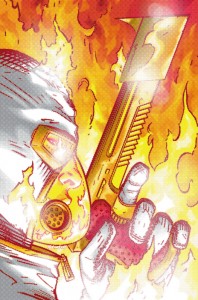I’m beginning to think that Final Crisis should have been an original graphic novel, not a miniseries.
I understand there are many reasons to do a big event as a miniseries. People are more willing to spend $3.50 a month for 7 months than to drop $20-25 all at once. And they’re more willing to pick up a first issue to try it, knowing that if they don’t like it, they don’t have to pay for the rest of the series (while with a book it’s all or nothing). It’s easier to schedule tie-ins. Plus it keeps the hype engine going for longer.
But those are all business reasons. Let’s look at artistic reasons. Specifically this one: it’s clear that Final Crisis will read better all at once than in serialized chapters.
After the contention that the series requires the reader to be a walking encyclopedia of arcane DC knowledge (a claim with which I disagree), the biggest complaint about Final Crisis is that it isn’t clear what’s going on. There’s a sense that you need to have read interviews and annotations just to follow it.
It seems like readers want an inverted pyramid structure to their comics. Establish all the players up front, then jump into the conflict. Which is certainly a valid way to tell a story, except that:
- It’s not the only way to tell a story.
- It’s not even what comics readers really want.
Movies and novels frequently tell stories where they give you only pieces of information, bit by bit, and slowly assemble them into a whole so that by the time you get to the end, or three-quarters through, or half-way through, you know what’s going on. Before the sequels soured people’s memories of the first film, The Matrix was massively popular — but it takes a long time before Neo — and the audience — find out what’s really happening.
And really, people don’t want everything spelled out ahead of time. They want to be surprised. They want the rush of a cliffhanger ending. And when you spend an entire issue establishing the situation and players, like in Final Crisis: Legion of Three Worlds, they complain that it’s all setup, and it’s like “reading a Wikipedia article.”
The problem is trying to mix the story structure Grant Morrison is using for Final Crisis with the serialized format.
A movie can spread out the exposition because it’s a whole work intended to be watched all at once. A novel can get away with it because it’s perceived as a whole work, not as series of connected stories. You can pause reading a novel and know that you can read the next part, which might explain more, anytime you want. When you have to wait a week for the next episode of a TV show, or a month (or two, or more) for the next chapter of a serialized comic, waiting for things to make sense can be a much more frustrating experience.
So doing it as a graphic novel would solve that problem. Have the whole thing come out in one volume. People can sit down, read it at their own pace, and follow the pieces as they come together. They can see how the story works as presented on the page, and then if they want to look deeper into symbolism, see how it connects to 70 years’ worth of shared universe stories, or do a literary analysis, then they can look up the annotations.

